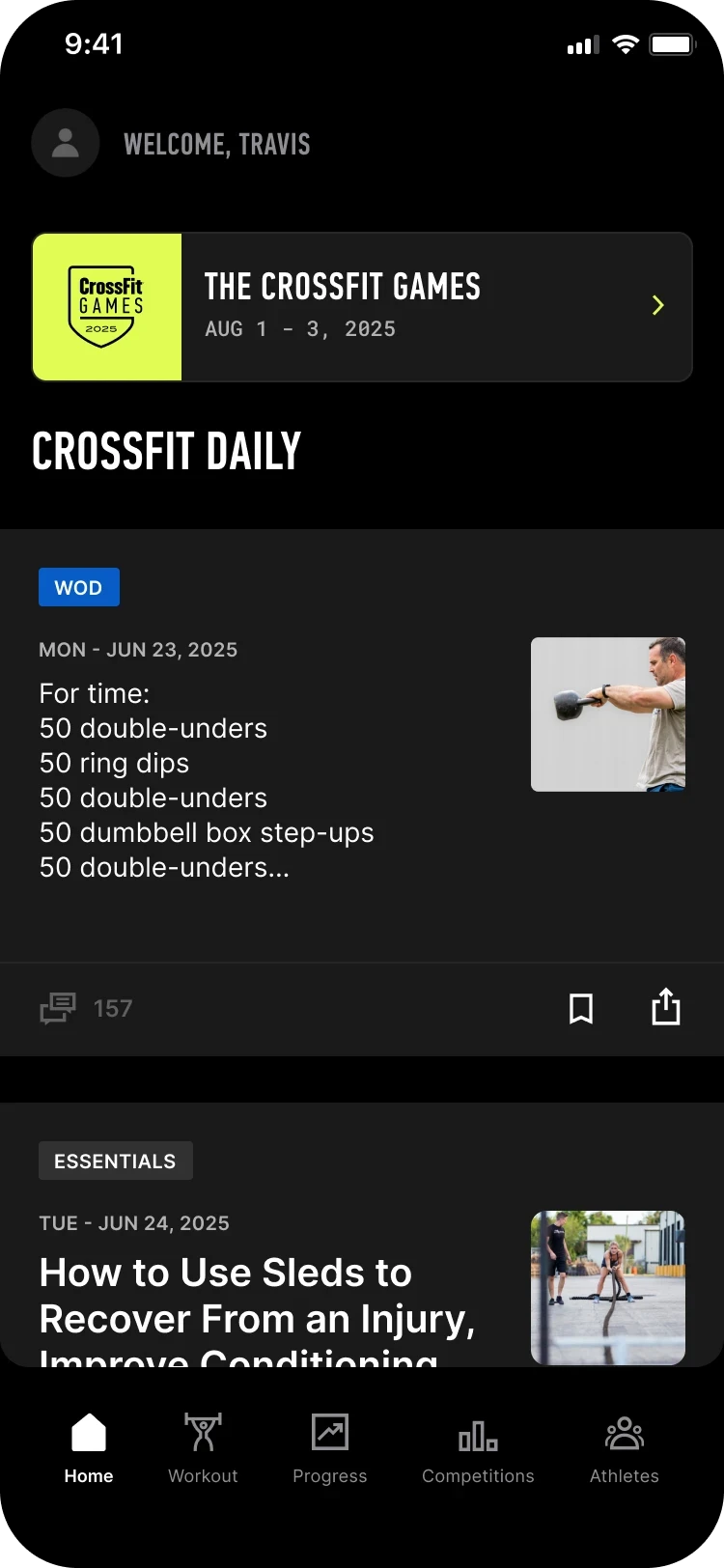Redesigned the Open and Quarterfinals registration flow to bundle competition registration with merch, reducing friction for users and generating over $1 million in new revenue while establishing a scalable commerce capability.
Role:
Lead Product Designer
Project Focus:
Growth / Combining Checkout Flows
Duration:
8 weeks
Capitalizing on CrossFits largest D2C moment of the year
The CrossFit Open and Quarterfinals are the organization’s largest direct-to-consumer events, with over 300,000 athletes in 100+ countries. Many participants want both a competition registration and a commemorative t-shirt, but these were sold through separate checkout systems (registration, judges course, and merchandise).
This disconnected experience created friction for users and limited a major revenue opportunity for the organization.
Design a streamlined purchase experience that allows athletes to bundle competition registration with merchandise and relevant add-ons, reducing friction, increasing conversion, and driving direct-to-consumer revenue.
-> Increase shirt + registration conversion to 20%+ (from baselines of 6–13%)
The Process
Design worked alongside engineering to integrate backend functionality while providing research insights to inform business decisions around shipping, pricing, and bundle strategy. This simultaneous approach allowed us to iterate quickly and make user-centered decisions even when some business details were still pending.
Through discussions and workshops, we aligned around the following constraints and flow of work:
Technical constraint: Registration had to remain in the middle of the flow
No clear merch strategy on pricing, bundling, or shipping policies
Tight deadlines with simultaneous engineering + design workstreams
We conducted 10 user sessions using testable interactive prototypes and gathered survey feedback with 100+ customers to validate the bundle checkout flow.
Key Insights:
Flow was intuitive, users wanted sizing/material info for shirts, judges course felt like a relevant add-on, shipping costs were a potential barrier.
Overall, users found the flow straightforward and followed typical e-commerce patterns.
“It’s easier to bundle your spending altogether when you register and are feeling enthusiastic.” – Neal (User Interview)
User Insights → Design Implementation
Based on user feedback, we refined the bundle flow to balance simplicity with flexibility:
Limited bundle options to one shirt design
Provided clear sizing guide and material information for informed purchases
Made it easy to remove the shirt if shipping costs were prohibitive
Maintained a simple, intuitive flow aligned with user expectations
Usability Testing
Leveraging Internal HQ registration for testing + feedback
Before the public launch, we leveraged the internal team registration period, having 100+ team members complete the registration and checkout flow. Participants provided feedback scores on ease of use, helping us identify friction points early.
This process also allowed the QA team to document bugs across countries, devices, and platforms, ensuring a smooth launch for all users.
Final Implementation
The final design implementation included an entirely new checkout flow:
Bundle selection page, review order, and order confirmation screens.
Centralized account experience to manage registration and merchandise orders
Streamlined bundle checkout flow with clear add-ons
High-fidelity designs implemented before Open registration launch
Quick UX fixes released live during registration period
Outcomes
$1M+ in merch sales through the bundle page flow in 2025
Measurable Results
The Bundle delivered significant business and user experience improvements across 3+ competitions:
30% cumulative conversion on the bundle landing page
70% YoY increase in value per participant
$1M+ in merchandise bundle sales, despite lower overall participation
Strategic Impact
Reduced friction by consolidating three separate purchase flows into one seamless checkout experience
Built a reusable capability to bundle registration, merchandise, and education for all CrossFit competitions
Enabled merch as a legitimate, sustainable fourth line of business
Provided actionable insights for future product, pricing, and shipping strategies











